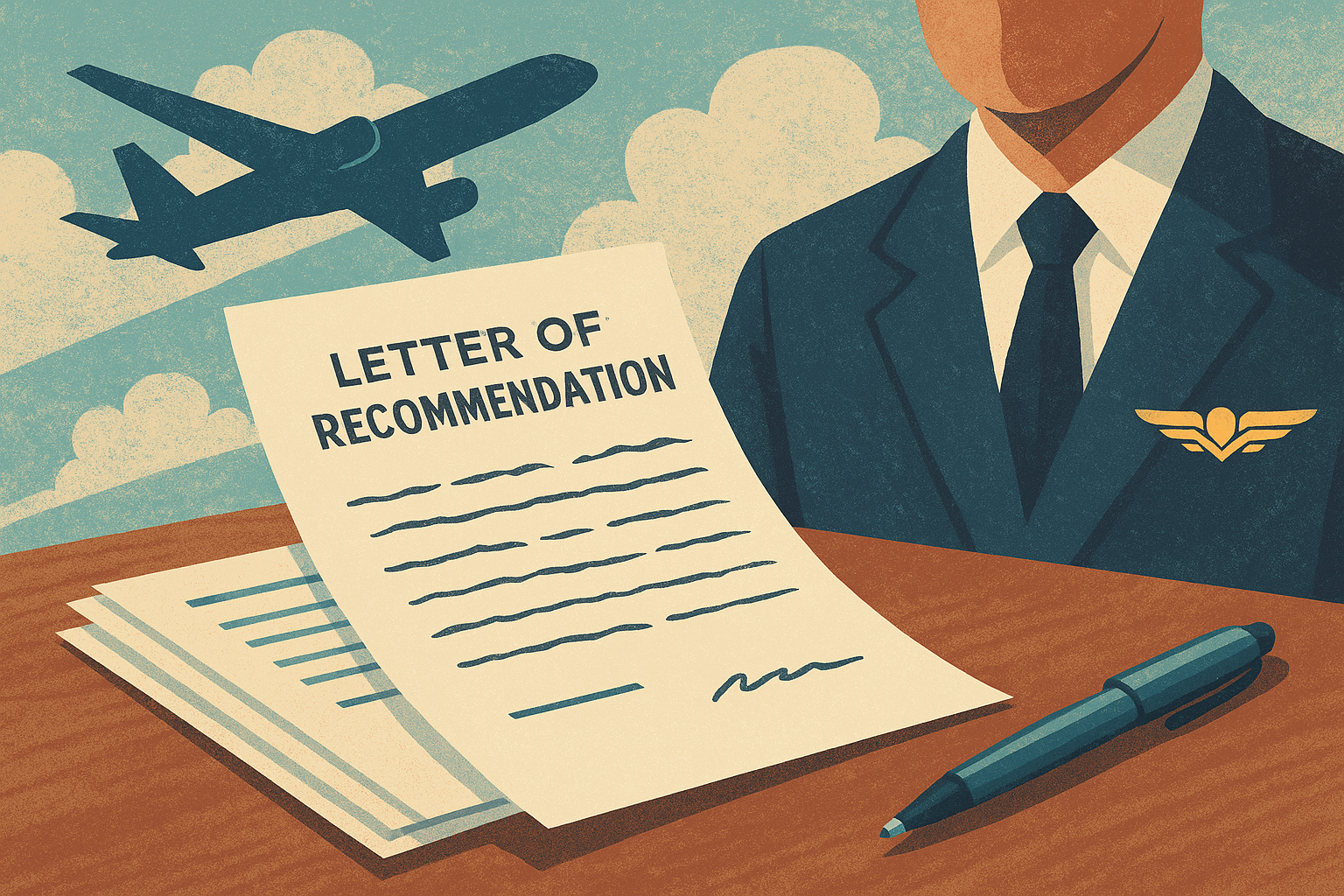Crafting a Good Letter of Recommendation Supporting an EB-2 NIW Petition for Airline Pilots
Date of Information: 07/07/2025
Check back soon; we update these materials frequently

Introduction
The EB-2 National Interest Waiver (NIW) allows foreign nationals of exceptional ability or advanced degrees to bypass the labor certification process if their proposed work substantially benefits the United States. For airline pilots, crafting a compelling letter of recommendation (LOR) is critical to demonstrating how their skills and contributions rise to the level of national interest.
Key Elements of a Strong Letter of Recommendation
1. Author Credentials and Relationship to the Beneficiary
The recommender should have significant credentials (e.g., Chief Pilot, Director of Flight Operations, FAA official, aviation professor).
Clearly explain how the recommender knows the pilot, the nature of their working relationship, and how long they’ve known each other.
2. Pilot’s Background and Accomplishments
Outline the pilot’s total flight hours, certifications (ATP, type ratings), aircraft experience (e.g., Boeing 737, A320), and safety record.
Emphasize any awards, commendations, or special missions (e.g., medevac, disaster relief, international relief flights).
3. Specialized Knowledge or Experience
Describe any experience with aviation safety protocols, flight instruction, maintenance oversight, or airline policy development.
Highlight involvement in pilot training programs, flight standardization boards, or aviation regulatory bodies.
4. National Importance of Their Work
This is an especially important component of letters supporting an EB-2/NIW application because it is an essential element of the national interest waiver analysis on which airline pilots tend to struggle.
Connect the pilot's work to the broader national interest: e.g., ensuring reliable transportation, maintaining critical infrastructure, supporting logistics networks, or contributing to aviation safety.
Reference shortages in qualified airline pilots and how the pilot helps fill that gap.
5. Impact Beyond the Employer
Again, this is a crucial component of letters supporting an EB-2/NIW application because the standards applicable to a national interest waiver require evidence that the applicant’s proposed endeavor will benefit the United States as a whole, not just a particular employer or even an entire industry. For more information on the standards for a national interest waiver, see our research guide on that topic.
Emphasize how the pilot’s contributions affect the aviation sector or the traveling public at large, not just a single company.
If applicable, discuss innovations in aviation procedures, participation in research, or influence on industry practices.
6. Conclusion and Strong Endorsement
Close with a firm endorsement of the pilot’s petition.
State that the pilot is a professional of exceptional ability.
Clearly state that granting the NIW would benefit the United States.
Sample Language Excerpts
Opening: "I am writing in strong support of Captain [Name]'s petition for a National Interest Waiver. As the Director of Flight Operations at [Company Name], I have supervised Captain [Name] directly for over five years."
Professional Impact: "Captain [Name] has logged over 9,000 flight hours, holds multiple type ratings, and has consistently demonstrated impeccable judgment and adherence to FAA safety standards."
National Benefit: "In light of the severe shortage of qualified commercial pilots, Captain [Name]'s service ensures continuity in essential air transport routes, particularly in underserved regions critical to national logistics and healthcare access."
Closing: "Captain [Name] is an exceptional pilot whose continued contribution to U.S. aviation unquestionably serves the national interest. I strongly urge USCIS to approve this petition."
You can click or tap here to download some templates for Letters of Recommendation. However, please note that Charles International Law does not guarantee the efficacy of these templates and provides them merely to illustrate the suggestions provided above.
Final Tips
Use professional letterhead with contact information.
Include signature and title.
Avoid vague praise; provide concrete examples.
Keep the letter concise (1.5 to 2 pages).
FAQ: EB-2 NIW Recommendation Letters for Airline Pilots
What is the purpose of a recommendation letter in an EB-2 NIW case for pilots?
A well-crafted LOR helps show that the pilot’s proposed endeavor has “substantial merit and national importance,” that the pilot is “well positioned” to advance it, and that granting a waiver benefits the U.S.—the three prongs from Matter of Dhanasar (AAO 2016). It also supports underlying EB-2 eligibility (advanced degree or exceptional ability). Department of Justice+2eCFR+2Who should write the letter?
Senior aviation professionals with direct knowledge and recognized authority—e.g., Chief Pilot, Director of Flight Operations, FAA designee, training captain, airline safety/standards leader, or an academic/industry figure. This aligns with your page’s guidance on author credentials. Charles International LawHow many letters are recommended?
Quality over quantity. Many cases submit 3–5 strong letters from diverse perspectives (operations, safety, training, industry impact). USCIS doesn’t mandate a number; focus on coverage of the Dhanasar factors. Department of JusticeWhat key elements should each letter include?
Author credentials/relationship, the pilot’s qualifications (hours, type ratings, aircraft, safety record), specialized contributions (training, SOPs, safety initiatives), national importance beyond one employer, and a clear, unambiguous endorsement. This mirrors your page’s structure. Charles International LawHow do letters prove “national importance” for pilots?
Tie the pilot’s work to safe, reliable air transportation, resilience of critical infrastructure, service to underserved regions, and sector-wide safety/training improvements—linking individual impact to national systems. Charles International LawShould letters discuss the U.S. pilot labor market?
They can, carefully. If used, cite neutral, reputable data (FAA/GAO) and avoid sweeping claims. Don’t overstate shortages; show how the applicant’s contributions advance safety, training capacity, and continuity of essential routes. Federal Aviation Administration+1Do letters need exhibits or data?
They can reference verifiable facts (e.g., safety metrics, program roles, training outcomes) and attach or cross-reference evidence in the record. Assertions carry more weight when anchored to documents or public sources. USCISWhat tone and length work best?
Professional, specific, and concise (about 1.5–2 pages). Avoid vague praise; use concrete examples of contributions and outcomes, consistent with your page’s “Final Tips.” Charles International LawIs notarization required?
Not generally. USCIS evaluates substance and credibility. Notarization can bolster formality, but it isn’t a regulatory requirement for NIW letters. (Substantive content tied to Dhanasar is what matters.) Department of JusticeCan letters be on company letterhead and signed electronically?
Yes—company letterhead is preferred. Electronic signatures are commonly accepted if they’re reliable and the letter is otherwise credible and verifiable. (Always include contact info/title.) Charles International LawShould letters address EB-2 eligibility (advanced degree or exceptional ability)?
Yes—where appropriate. For exceptional ability, authors can speak to the regulatory criteria (experience, licensure, remuneration, recognition, etc.), while the petition supplies the formal evidence required by 8 C.F.R. § 204.5(k). eCFR+1How do we show impact beyond the employer?
Describe training doctrine adopted across fleets, safety SOPs influencing other operators, participation in standards boards, mentoring pipelines, or broader public benefits (e.g., medevac/relief operations). Your page emphasizes this element. Charles International LawCan an author outside aviation (e.g., logistics/healthcare leader) help?
Potentially—if they credibly connect the pilot’s work to national logistics, medical access, or disaster response, reinforcing “national importance.” Charles International LawAre templates safe to use?
Templates are fine as scaffolding, but every letter should be customized to the author, relationship, facts, and Dhanasar prongs. Your page links templates with a caution to tailor them. Charles International LawBottom line for authors
Be specific, be truthful, and tie achievements to national-level benefits. Close with a clear, strong endorsement that approving the NIW benefits the United States.
Other Helpful Resources:
See Also:
CIL Guide to EB-2 Applications
CIL Guide to NIW Applications
CIL Guide to Applying for an EB-2/NIW Visa as an International Airline Pilot
CIL Guide to Professional Organizations Supporting an EB-2/NIW Application as an International Airline Pilot

